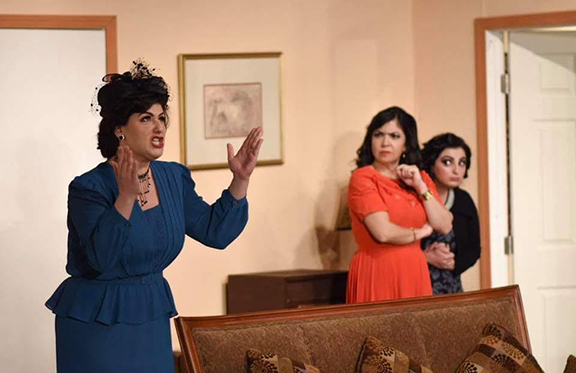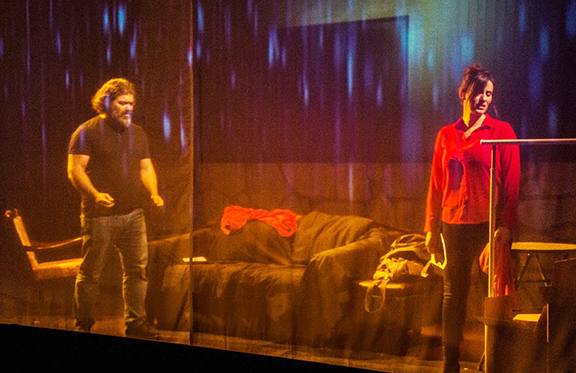
A scene from “Lend Me a Tenor”
BY ARAM KOUYOUMDJIAN
The two plays that have ushered in the new year of Armenian theater could not be more different than one another. Krikor Satamian Theater Company’s “Tenor Muh Gouzvi” (Lend Me a Tenor), a translation of Ken Ludwig’s oft-staged farce, is light as a feather. By contrast, “Yes, Adam Noorian,” the debut effort of High Gadfly (in association with Homenetmen’s Glendale Ararat Chapter), is an ambitious work so heavy with self-importance that it struggles under its own weight.
Before we get to the substance of “Adam Noorian” (about which there is much to say), let’s dispense with Satamian’s latest confection – a mindless piece of entertainment with a modest ticket price ($25) but a high cost in the number of brain cells it manages to destroy within the course of two hours.
Set in the 1930s (thought written in the ’80s), Ludwig’s play unfolds at the Cleveland Opera House, where Tito Merelli, a tenor of great renown, is expected to make his debut. However, the star shows up late, in poor health, and unable to perform. In a panic, the opera’s general manager attempts to salvage the situation by having his assistant, Max, impersonate Tito by donning the make-up and wig of the character he is to portray. Max’s impersonation naturally leads to a great deal of mistaken identity. Hilarity ensues – or should, but only occasionally does.
Despite a stilted translation of an altogether silly script, the production somewhat redeems itself thanks to its cast. There are certainly weak links among the performers, prone to over-the-top theatrics. Among the finer performances, however, are those of Alex Khorshidian as Tito, Arpi Samuelian as his stern wife, and Maral Nashalian as the slinky soprano flirting with him to advance her career, while Peter Nishan is altogether hilarious as a bellhop with an outsized personality.
Having added performance dates, “Lend Me a Tenor” plays through February 19.
***
The title of “Yes, Adam Noorian” makes for a clever bilingual pun, since “yes” means “I” in Armenian; however, the production’s boast (in its promotional materials) that it is the “first bilingual play in Armenian and English” is simply erroneous. Several bilingual plays in those two languages have graced Los Angeles stages over the course of at least 25 years. Works by Shahé Mankerian and Rafi Akmakian immediately come to mind, as do Lory Tatoulian’s sketch comedy shows and my very own first play, “Survivors,” staged back in the early 1990s.

A scene from “Yes, Adam Noorian.” (Photo by Narek Hartunian)
“Adam Noorian,” constructed around Hakop Karapents’ novel “The Book of Adam,” is the story of an Armenian immigrant from Iran – a divorced “script doctor” contending with writer’s block, relationship conflicts, and identity issues arising from his hybrid existence in a diasporan setting. Written and directed by Armen Sarvarian for a seven-performance run at the Atwater Village Theatre, the multimedia production blends live scenes, video vignettes, and projections to weave together a complex narrative that is part rumination and part action.
Both creative and bold, the production is unafraid to take risks by engaging in philosophical contemplation, by allowing an unhurried pace and mood, and by venturing beyond the usual confines of genre and storytelling structure – all of which are rare achievements in Armenian theater. But does it pull off this high-wire act? Not entirely. Karapents’ writing is lyrical and lovely – and perhaps better suited for reading than performance; the textual material added by Sarvarian contemporizes the dialogue but occasionally renders it stiff and cliché. “Adam Noorian” consistently opts for indulgent musing, rather than opportunities for dramatic tension, until it verges on pretension.
An extraordinary amount of work has gone into the production, from the filming of the video sequences to the conceptualization of the projections, which include replicas of social media posts. The play’s critique of social media is ironic, given the way it relentlessly publicized itself on Facebook; nevertheless, the production’s level of technical difficulty is high and impressive – but also a liability of sorts, since it comes at the expense of much else.
The scrim on which the projections appear actually separates most of the actors from the audience for virtually the entire play. Coupled with the fact that the production is oppressively underlit, the forbidding scrim makes viewers feel like they are watching the proceedings through gauze. The effect may be intentional (perhaps to imply entrapment), but it is distancing and visually punishing.
Equally punishing is the production’s three-hour running time (including a late start and an intermission). The pace of the play is often glacial and its tone usually ponderous, while humor is rare and, at times, misplaced. Clever elements pepper the script, such as the American Dream imagined as a video game (of material pursuit), but the play typically doles out earnestness rather than biting satire.
Matters are not helped by cast members who substitute brooding for acting, although, in their defense, the way their dour characters are written could have invited this choice. Dro Arzo’s lead performance, is particularly understated and low-energy; indeed, several of the performances are lackluster, although Lorita Meg and Janet Voskanian prove effective in small parts, and Serj Aslanian steals his scenes as Vahik, the show’s sole source of authentic comedy.
Hurtling toward a messy ending, “Adam Noorian” endeavors, with little success, to reconcile elements of meta-theatricality, Zen closure, unexpected tragedy, and – bizarrely enough – random absurdity, all within the span of its final 15 minutes.
Sarvarian is a promising talent, to be sure, whose first foray into theater must be lauded for its daring. His background in film will hopefully inspire far more judicious editing of his future theatrical ventures.
Aram Kouyoumdjian is the winner of Elly Awards for both playwriting (“The Farewells”) and directing (“Three Hotels”). His forthcoming play is “Kabaré.”
Source: Asbarez
Link: THEATER: Silly ‘Tenor,’ Ponderous ‘Adam Noorian’ Start Theater Season at Opposite Extremes
